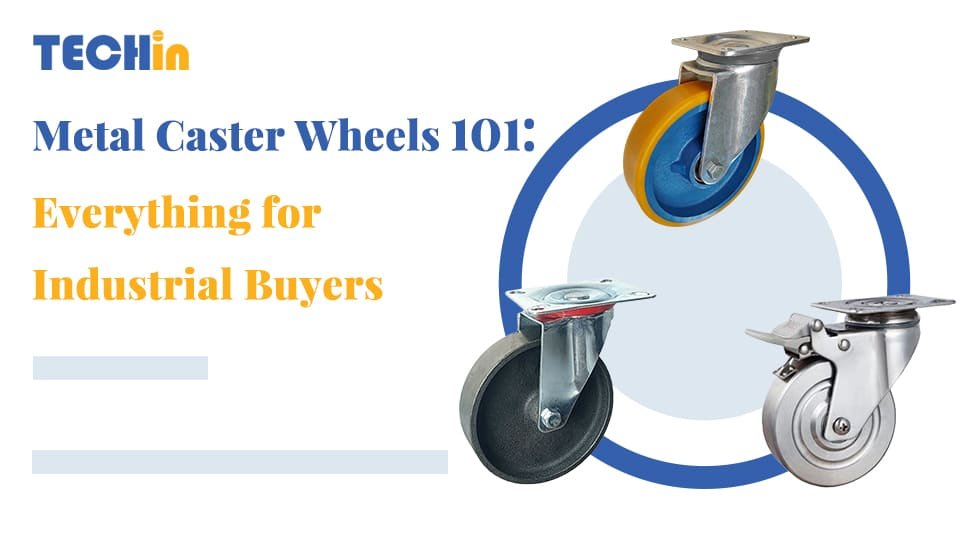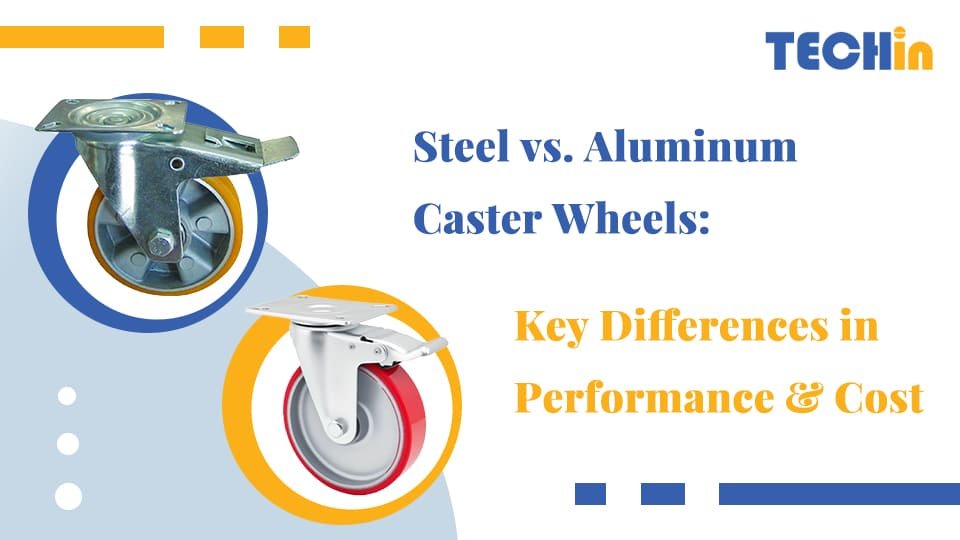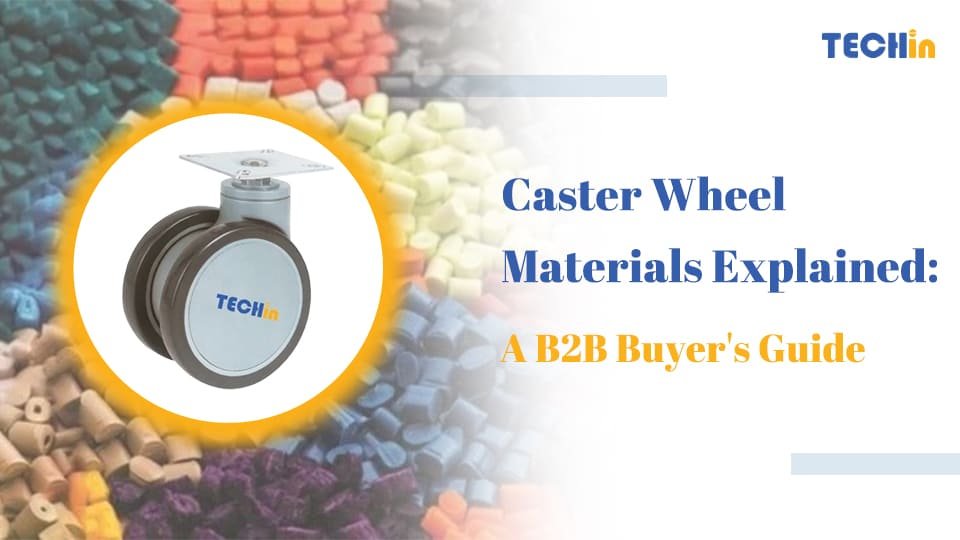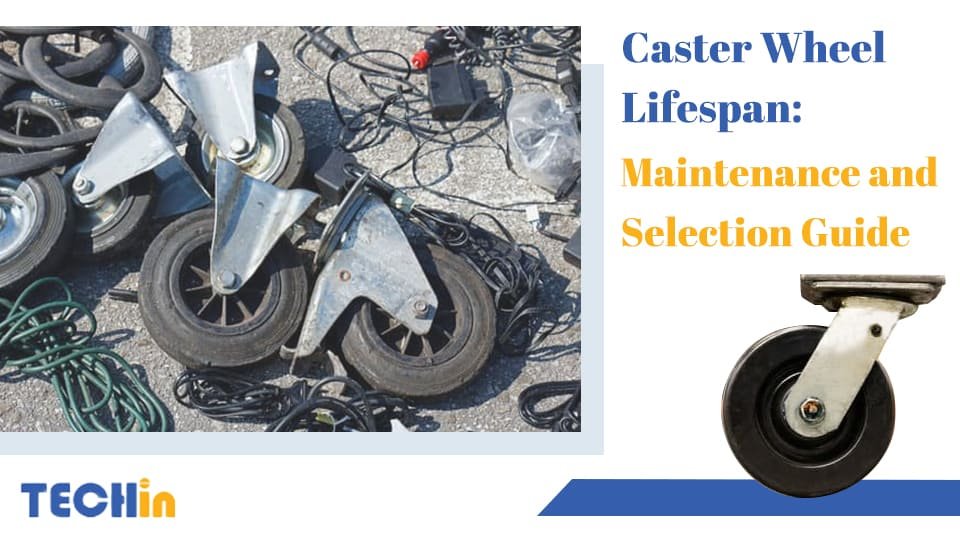Choosing the right caster wheel is crucial for safety, efficiency, and performance. The wrong choice can result in floor damage, equipment instability, or premature wear. In this guide, we’ll break down caster types, materials, and their best-fit applications—so you can make informed, cost-effective decisions.
Caster wheels come in various types—like swivel, fixed, braked, and locking—and are made from materials such as rubber, nylon, polyurethane, and stainless steel. Each type is designed for specific use cases, including industrial carts, furniture, hospital beds, and high-temperature environments.
Keep reading to discover how each caster type works, what materials suit your environment, and how to choose the best option for your specific application.
What Are Caster Wheels?
Caster wheels are rolling mechanisms mounted underneath objects like carts, furniture, and equipment to enable movement. They enhance maneuverability, reduce strain during transport, and are critical for both operational safety and workflow efficiency across industries like manufacturing, healthcare, and logistics.
What Are the Different Types of Caster Wheels?
Caster wheels are typically grouped by function—how they move, lock, or support loads. Below are the most common types:
Swivel Casters
Swivel casters are designed to rotate 360 degrees, allowing for flexible movement in any direction.
Applications: Used in shopping carts, hospital beds, office chairs, and transport trolleys that require maneuverability.
Fixed (Rigid) Casters
These do not swivel and only move forward or backward, offering better stability in straight-line motion.
Applications: Ideal for conveyor lines, tool carts, or racks that don’t require directional changes.
Braked Casters
Braked casters come with locking systems to secure the wheel in place. Some have wheel brakes, while others offer a total lock that prevents both wheel rotation and swivel movement.
Applications: Common in medical trolleys, mobile workstations, and display units where stability is occasionally needed.
Locking Casters
Locking casters typically feature mechanisms that lock both the wheel and the swivel head for maximum security.
Applications: Best for heavy equipment, diagnostic machines, and shelving units in high-traffic environments.
Caster Wheel Materials and Their Applications
Rubber
Rubber casters are soft, quiet, and excellent for protecting floors. They provide good shock absorption, which reduces noise and vibration during movement.
Applications: Commonly used in libraries, retail stores, schools, and offices where silence and floor safety are important.
Nylon
Nylon casters are hard, durable, and resistant to moisture, oil, and chemicals. They have low rolling resistance and high load-bearing capacity.
Applications: Ideal for industrial manufacturing environments, food processing plants, and chemical warehouses.
Polyurethane (PU)
PU casters offer a great balance between strength and floor protection. They are non-marking and resistant to abrasion, making them suitable for high-traffic areas.
Applications: Widely used in logistics, hospital equipment, material handling, and clean production facilities.
PP (Polypropylene)
Polypropylene casters are lightweight, cost-effective, and resist chemicals and moisture. They have a hard tread, making them less suitable for delicate flooring.
Applications: Suitable for light-duty carts, shelving units, and household items where budget is a concern.
PVC
PVC casters are corrosion-resistant and provide a smooth, consistent roll. They are relatively soft and won’t damage floors.
Applications: Used in janitorial carts, wet environments, or environments with high humidity like commercial kitchens.
TPR (Thermoplastic Rubber)
TPR combines the elasticity of rubber with the toughness of plastic. These casters are quiet, non-marking, and provide better grip on smooth surfaces.
Applications: Common in medical trolleys, hospital beds, lab equipment, and electronic instrument carts.
Stainless Steel
Stainless steel caster frames offer excellent corrosion resistance and hygiene. Often combined with other wheel materials, they’re suitable for sensitive environments.
Applications: Found in pharmaceutical labs, cleanrooms, food production, and outdoor environments exposed to moisture.
Cast Iron
Cast iron wheels are extremely strong and can support very high loads. However, they are noisy and can damage floors if used without protective pads.
Applications: Used in factories, machine shops, and heavy manufacturing where floor surface is not a concern.
High-Temperature Casters
Made from heat-resistant compounds like phenolic resin or special rubber blends, these casters withstand temperatures up to 750°F (400°C) or more.
Applications: Used in ovens, autoclaves, bakery equipment, and heat-treatment lines.
Choosing the Best Casters for Your Needs
When selecting caster wheels, consider the following criteria:
- Load Capacity: Ensure each caster supports the maximum load, plus a 25% safety margin.
- Flooring Type: Choose rubber or TPR for delicate floors; nylon or cast iron for durability.
- Movement Requirements: Swivel casters for maneuverability; fixed for straight-line travel.
- Braking Needs: Use braked or locking casters for added safety and stability.
- Temperature Resistance: High-temp casters are essential in extreme environments.
- Caster Wheel Sizes: Larger wheels offer smoother movement over rough or uneven surfaces.
- Caster Wheel Material Selection: Balance cost, performance, and floor compatibility.
- Special Features: For secure positioning, consider using a caster wheel with lock.
For heavy duty caster wheel types, opt for polyurethane or cast iron casters mounted on reinforced brackets for industrial use.
Summary
Knowing the differences in caster types and materials will help you select wheels that perform reliably and safely. Whether you’re equipping a warehouse or a hospital, the right caster will save time, reduce costs, and improve mobility. Still unsure? Reach out—we’re happy to guide your purchase.










